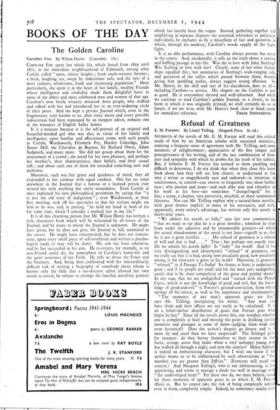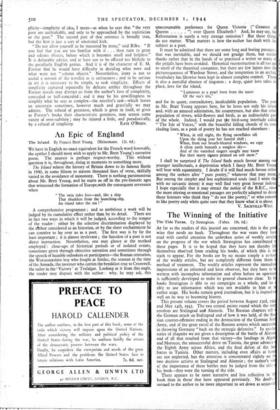Refusal of Greatness
E. M. Forster. By Lionel Trilling. (Hogarth Press. 8s. 6d.)
STUDENTS of the novels of Mr. E. M. Forster will read this critical study of him by an American scholar with sustained attention; enjoying a frequent sense of agreement with Mr. Trilling, and some moments of enlightenment ; appreciative of the fine temper and perceptiveness of his writing, and of the just combination of firm- ness and sympathy with which he probes for the truth of his subject. But, if hitherto E. M. Forster has seemed to them puzzling and difficult to determine, I do not think that when they close this latest book about him they will see him clearer, or understand at last why a writer so magnificently sure and endowed—in intention, in sensitiveness, in control—can swerve so frequently into sheer feeble- ness ; why passion and irony—and each alike true and relentless in his work at his best—are sometimes " changelinged," for a line, a scene, a chapter, into perversity, mischief, or sheer sentimental falseness. Nor can Mr. Trilling explain why a natural-born novelist, with great themes implicit in many of his utterances, and with, apparently, every writer's advantage, has written only five novels in thirty-nine years.
." We admire his novels so fully," says this new commentator, " that we want to say that he is a great novelist ; somehow he slips from under the adjective and by innumerable gestures—of which the actual abandonment of the novel is not least—signal§ to us that he is not a great novelist. . . . His refusal of greatness is a refusal of will and that is bad. . . ." True ; but perhaps not exactly true. Do we admire his novels fully? Is " fully " the word? And of his very distinguishing and idiosyncratic " refusal " of greatness, can we really say that it is bad, seeing how peculiarly good, how peculiarly strong,. is the character it gives to his work? Moreover, is greatness " refused " in A Passage To India? Its theme, at least, is audaciously great ; and if its people are small and for the most part undignified, surely that is by sheer compulsion of the great and painful theme? In any case, that we are undignified and " cursed with the Primal Curse, which is not the knowledge of good and evil, but the know- ledge of good-and-evil " is Forster's ground-conviction, from which springs all his mercy, as well as his impatience and sentimentality. " The moments of any man's apparent grace are few," says Mr. Trilling, interpreting his writer. " Any mars can have them and their effects are not easily to be calculated. It is on a helter-skelter distribution of grace that Forster pins what hopes he-has." Since all the novels prove this, one wonders whether one is completely at fault and missing the point in disliking certain moments and passages in some of them—judging them weak and even hysterical? Does the author's despair go deeper and is .1 more sly and cruel than we have suspected? The Schlegel girls, for instance: do they betray themselves or their creator in that fussy, strange scene they -make when a very' unhappy young man has walked all through a night, and seen the sunrise? Helen Schlegel is indeed an embarrassing character, but I wish one knew if her author means us to be embarrassed by such observations as "Re- member you are greater than Jeffries." (Everyone will recall the context.) And Margaret Schlegel, who is not embarrassing, is dis appointing, and seems to manage a shade too well in marriage wi " the undeveloped heart." Yet these two do, we must believe, start for those moments of apparent grace in us which E. M. Forst tThsts to. But he cannot take ,the risk of being completely serio even in them, completely simple. Indeed, he sometimes insults sun-
plicity—simplicity of idea, I mean—as when he says that " the very poor are unthinkable, and only to be approached by the statistician or the poet." The second part of that sentence is broadly true, but the first is just a sort of emotional kick.
" Do not allow yourself to be mastered by irony," said Rilke. " If you feel that you arc too familiar with it . . . then turn to great and solemn objects, before which it becomes small and helpless." It is debatable advice, and at least not to be offered too blithely to the peculiarly English genius. And it is of the ,character of E. M. Forster that he would have difficulty in deciding what were and what were not " solemn objects." Nevertheless, irony is not so useful a servant of the novelist as is seriousness ; and to be serious in art it is necessary to be simple, to seek simplicity. Effects of simplicity captured repeatedly by delicate artifice throughout the Forster novels may distract us from the author's love of complexity, concealed or half-concealed ; and it may be his unwillingness to simplify what he sees as complex—the novelist's task—which leaves us uncertain sometimes, however much and gratefully we may admire. The refusal of greatness, which is great in itself, or gives to Forster's books their characteristic greatness, may screen some vanity of over-subtlety ; may be injured a little, and paradoxically,



























 Previous page
Previous page